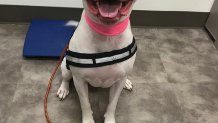Dogs are some of the most social, pack-minded animals on the planet, with a seemingly endless desire to be good boys and girls (Really, do we deserve them?).
Perhaps that's why Jax was all smiles, even after getting stuck with a needle at a vet's office in Bristow, Virginia. The pit bull-bull dog mix wasn't there to get a checkup, though: He was donating blood.

It's an often-unconsidered fact that in case of illness or injury, blood transfusions can save the lives of not just humans, but those of our furry companions too.
That's what happened after Indy, a Lab who's now 5 years old, ate gum containing xylitol — which is fine for humans, but very poisonous to dogs.
Indy's owners rushed her to the vet, where she had a seizure because of low blood sugar. The pup was transferred to Virginia Vet Centers in Fredericksburg, and over the next seven days, received intensive treatment including IV fluids and antibiotics.
Indy went into liver failure and was given six double units of canine plasma to keep her from bleeding to death, her owners said.

It took seven days before Indy was recovered enough to head home. Now, her blood is back to normal and she's happy at home.
Local
Washington, D.C., Maryland and Virginia local news, events and information
"Without the plasma donated from other dogs, Indy surely would not have survived this ordeal," her owners told News4 in an email.
Not every dog gets so lucky. Casey Mills, an account manager at the North American Veterinary Blood Bank, shared the story of another dog who came in to the emergency room needing multiple blood transfusions.
There was no blood available, and the dog died.
"There is a critical shortage of animal blood affecting the D.C. area right now," Mills said.
The North American Veterinary Blood Bank (NAVBB) is battling that shortage. It currently accepts donations at a vet's center in Bristow, Virginia, and is looking to expand to D.C. and Maryland. That would allow more people to donate conveniently.
A wide donor pool is needed: Animals have blood types just like humans. Cats have three different feline-specific blood types, and canines have a whopping 12.
Blood types aren't breed specific, but greyhounds are known for being universal donors, Mills said. Most dogs aged 1-7 that are in good health, have a good temperament and weigh more than 50 pounds can donate. (Cats must weigh 9.5 pounds. Here's more information on requirements).
"Many people do not realize the significant impact their dog could make," Mills said.
The dogs that donate under NAVBB's community donor model live at home with their families and come into the Bristow office to donate once a month.
Of course, dogs and their owners get perks for their efforts.
"They’re always so excited when they come in the door to see us because they know we’re going to give them tons of peanut butter or Milk-Bones ... whatever their little heart desires," Mills said.

The owner of one donor dog, Freddie, told News4, "Honestly, he does it for the peanut butter!"
Smiley Jax, who was rescued from a junkyard, hardly even notices the procedure, his owner Kristina says.
Pet owners get discounts on checkups and disease screenings — plus the satisfaction of knowing they could be saving the life of someone's best friend.
Claire Savage reported on this story



